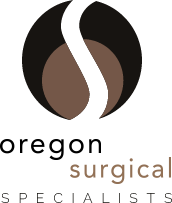PATIENT INFORMATION
Cholecystectomy: Surgical Removal of the Gallbladder
Procedure Instructions
Before Surgery
If you and your doctor decide that surgery is the best option for you, there are some things you should know:
- A low-fat diet can reduce the frequency and severity of attacks.
- Tell your doctor about all medications you are taking, including vitamins, supplements, and blood thinners.
- Call your doctor if you experience a high fever or changes in your skin color (jaundice).
- Do not eat or drink anything after midnight the night before your surgery.
- Make sure that you have someone to give you a ride home from the hospital.
During Surgery
- You will be put to sleep by the anesthesiologist before the procedure begins.
- If the procedure is to be done laparascopically, a gas is used to inflate the belly and lift the abdominal wall away from the internal organs.
- Four incisions are made to allow a camera and the surgical instruments into the abdomen.
- Small clips are used to close the bile duct and blood vessels to the gallbladder. These clips are left inside, but are not harmful to the body.
- The gallbladder is detached from the liver bed and removed.
- You will wake up in the operating room or in the recovery room, where nurses will monitor you. If your procedure was done laparascopically, you will return to your family in the short stay unit.
- Patients undergoing the surgery laparascopically will be required to stay a night in the hospital if your gallbladder is infected, if the surgery is done late at night, if you require a drain tube to remove excess fluid, or if you have other medical conditions that require monitoring as you recover from the surgery.
- Patients having an open cholecystectomy may need 3 to 7 days in the hospital for recovery.
Caring for Yourself after Surgery
Pain: Pain is common after surgery, especially around the incision site. You may also experience abdominal pain from the gas used to inflate your belly. The pain medication prescribed by your doctor will help with this pain, which should improve in the days following your surgery.
Fever: Your temperature can vary after surgery and a low-grade temperature is common. If your temperature exceeds 101.5 degrees or if it is accompanied by chills, vomiting, or flu-like symptoms, you should call the office.
Incision: When you leave the hospital, your incisions will be covered by a sterile bandage called a steri-strip. This will fall off or be removed at your post-op visit. There may be some drainage from the incisions; this is normal. The drainage should be thin, watery, and slightly pink, but should not be bright red blood. An infection may be starting if the drainage is thick green or yellow, or if the skin around the incision is red or warm to touch. Some swelling and bruising around the incisions is normal and should improve in the days following your surgery.
Constipation: Constipation is very common following a surgery. The anesthetic used during the operation paralyzes the bowel, which can lead to constipation for up to a week. Pain medications such as vicodin or percocet also cause the bowel to move more slowly. You may try over-the-counter medications such as milk of magnesia, Colace, or Metamucil, as well as prune or apple juice to get your bowels moving.
Diarrhea: Loose stool, or diarrhea, is a common side effect when the gallbladder is removed and typically occurs right after eating. Diarrhea should resolve in the weeks following the surgery, but can take 6 to 12 months in some people. Diarrhea is not a concern unless it is accompanied by fever, severe abdominal cramping, or if blood is present in the stool. Of course, you can lose a lot of fluid through diarrhea, thus it is important to stay well hydrated if you experience diarrhea after your operation. If the diarrhea is interfering with your daily activities, it may be safe for you to take an over-the-counter anti-diarrhea medicine. Check with your doctor first.
When to Call the Doctor
- Fever over 101.5 degrees.
- Persistent, increasing pain.
- Increased redness or drainage from an incision.
- Change in skin color/jaundice.
- Pain or swelling in your calf.
- Difficulty breathing.
When to Go to the Emergency Room
- Uncontrolled bleeding from the incisions.
- Persistent vomiting.
- Change in mental status.
- Inability to breathe.
You are always welcome to call the office with your questions or concerns. After hours, an answering service will direct your questions to the on-call providers. However, these individuals are unable to call in prescriptions for pain medication after 5 p.m.
